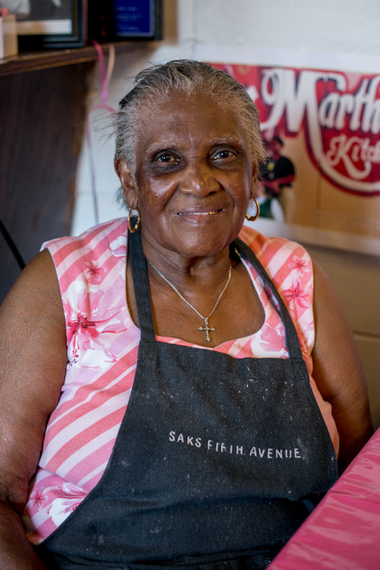It's hot in Charleston. A suffocating and steamy heat. A heat that makes your clothes stick to you and sweat drip down your back seconds after you step out of your front door. Charleston's streets are filled with a watery-mirage haze which disappears just as your car runs up on it, while digital billboards alongside the road urge passers-by to "Pray for the families. Pray for Charleston." Just two days after the massacre where nine members of the Emanuel AME Church lost their lives in a widely publicized shooting, the historic southern city has swelled with people. Those who share in the grief, offer assistance, report on the fatal events and just try to make sense of the week's nightmare all have come to gather in the welcoming city of Charleston.
Local residents and those who have made the pilgrimage to Mother Emanuel all have one thing on their mind -- the shootings and what it all means for them, the city and the country at large. Some have been pondering more questions while some seem to have found answers. Others struggle through tears to verbalize their broken hearts for those affected.
These are the voices of Charleston.
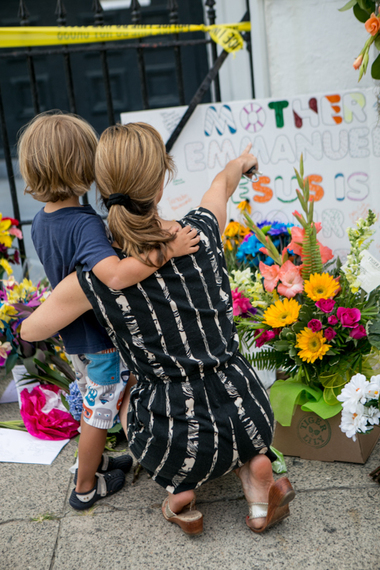
A mother and son place flowers on the memorial for those slain in the shooting. Photo Credit:Erika Chambers
Mentors at a Loss for Explanations
Around lunchtime at a local McDonald's in North Charleston, a group of young black boys pile in with their two chaperones. The boys are all dressed in black slacks and button-up white shirts. At first glance, one would assume it was a boy's choir or some other singing group, but it was the youth of the Knights of Pythagorus -- a masonic organization where young men are trained to be "respectful, honorable, and just grow up to be good men," according to one chaperone, Walter Rollins.
Rollins is an elderly black man with a head full of white hair and a white beard which surrounds a kind face. It is his duty to aid in the development of the young boys throughout their lives. This job gives him a unique perspective on the massacre and its alleged shooter:
I think the young man got a problem. He needs help. He's got a problem. He had to have hatred for a long time to commit something like that. I think it must have come from his parents. Maybe something happened to them that turned them that way -- to hate. I just don't understand it.
Rollins shakes his white head. "He spent an hour in church and bible study. They's got to be something wrong with him. He's sick. Anybody in their right mind who would sit there in bible study -- studying the Bible -- how could he do that?"
The boys' other chaperone, Al Pinkney, walks over with his tray of lunch, sits beside his friend and joins in the discussion. "It's hard to pinpoint what was going on in his mind, but with all the things he said, you know from his perspective that he feels that that the black people are taking over. It seems like a racial thing." When asked how it all makes him feel, Pinkney replies:
I have different emotions about it. Was it just a racial thing about all blacks? It's been a terrible situation for so many, and my heart goes out to every one of the families. Some people think that life doesn't matter, but if someone thinks life doesn't matter because of the color of your skin? That's where I've got a problem.
The two men are very aware of their role as mentors to a younger generation. How do they deal with the situation when talking to the boys in their charge? Rollins encourages them to live fearlessly and openly, "I just tell'em that was one man. Just 'cause one man does it don't mean they all going to do it." Pinkney spent the morning discussing the newspaper with his group of boys: "I bought the newspaper and spoke with the young men in my car on the way to the conference. I just listen and talk to them; try to help them sort it all out, but I don't know if we'll ever sort it all out."
The Reality of Charleston
Down the street from the restaurant is a local hotel where a receptionist, Shara Raysor, sheds light on the dangers those close to her have faced in Charleston. Shara is bright and eager to talk despite the dark subject matter. Although incredulous to the reality of the shootings, she relates, through her personal experience, to the grief many of Charleston's residents are living with. "I'm so sorry for what happened to those people. Just so much that has happened -- you don't know how to accept it. Last year, I had a friend that got killed outside of a barber shop, and I just had seen him. I got the call like 30 minutes later, he was dead by the dumpsters." Raysor takes a moment to collect her thoughts before continuing, "So, I mean you just don't know how to accept things no more right here in Charleston, because something happens every day."
Shortly after the discussion, Raysor's friend, Shane Gilliard, a local taxi driver, walks into the hotel lobby for a visit and gives his own opinions regarding the shooting:
I was talking to one of the reporters in my cab, and he asked me a bunch of questions about it, and I told them I didn't think he was crazy. I think someone sent him to do that. For him, I think he was part of an organization that hates. If he do this, he can go up the next level. I don't see no black and white issue here, we have black and white cops and black and whites on the basketball courts. I don't see a real race issue here. He said he thought black people are taking over, but we only just now got a black president! How are we taking over?
Gilliard laughs at the absurdity of the shooters accusations and their irony when compared to reality, but his joviality is short-lived when the discussion turns to the recent arrest of the shooter and his treatment by police. "I had three or four friends call me and say, 'Hey man, the police are treating him like a baby! If it was a black guy, they would kill us!' This right here is the truth!" For Gilliard, the reality of that situation is much less than humorous.
Questions in the Kitchen
In a local soul food establishment that is big on flavor but small in square footage, Martha Lou Gadsden sits. At 85 years old, she has been owner and operator of Martha Lou's Kitchen for 32 years. Gadsden's white hair is pulled back, but some strands escape, surrounding her shining face with an ethereal and wise glow. She is quick to speak, but soft -- almost airy in her tone, especially when asking questions. Her voice pleads for answers, for the decades she lived under Jim Crow, the absurdity of hating someone based solely on a skin color, and the horror of the massacre that occurred not a 10 minute's drive from her famed Kitchen. "I ain't slept in two nights. It's been working on my nerves. I don't want to watch the news, but then I don't want to miss something, but it is too sad," she said.
Gadsden admits to knowing one of the victims and speaks highly of his character, "I knew a couple of them [the victims.] I knew the Reverend Simmons, he was my daughter's pastor. When my brother was sick, he'd go see him every week. Not many a man would go every week, you know."
When asked about her feelings on the shootings, her brow furrows and she speaks slowly and deliberately -- using the white faces of the interviewers to make her points even more personal:
I just can't understand. Y'all two in here with me, and I'm thinking you are my friends, and you gone come and kill me? I mean, that's sad. That's sad. I mean we're taking you under our wings, and you gone come in here and pray with me and we talk together, then you gone stand up and say you gone kill me because you hate me?
She emulates a male's voice: "'Y'all taking away from us!'"Then she holds her empty hands out and looks around, wide-eyed, "What are we taking? We ain't taking anything. We living just like you live. You know? It's hard. It's hard. And I -- I don't know. It was just a shock. It was a shock. It was a shock."
'Am I Next?'
A young lady places a flower among the thousands others laid by grief-stricken mourners. Her shirt catches the eyes of everyone around her. Christina Thomas, a 20-year-old college junior from Augusta, GA, designed her shirt for the Ferguson situation, but felt its message warranted a second wearing. When asked about her shirt, Thomas delivers a passionate, emotionally charged explanation:
The shirt that I'm wearing is a shirt that I designed regarding the things that went on in Ferguson. I remember watching the news and seeing a boy about 10 years old and he had a sign that said, 'Am I next?' and that really stuck with me. I wanted to bring awareness to my campus, so I designed a shirt, and as big as I could possibly fit it, I put those words, 'Am I next?' I think that's a question that really hits home with minority youth. Plain and simple. A lot of things need to be changed in this country.
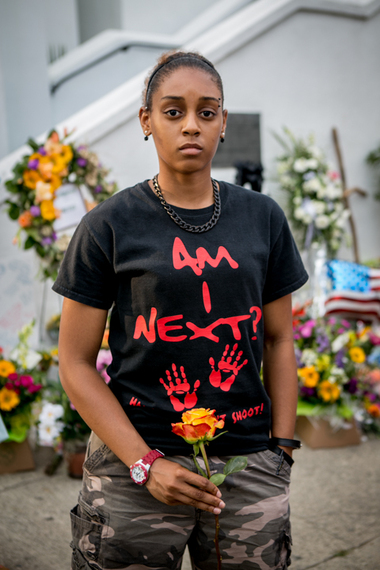
Christina Thomas stands before the memorial wearing a shirt she designed. "Don't be in denial. We do have racial tensions in this country. It's a real thing. There are things that need to be fixed." Photo Credit: Erika Chambers
There are those who could view Thomas' shirt and see a rebellious young adult populating negativity in a racially-charged south. To them, Thomas has a few words to say:
I would tell them, 'Don't be in denial. We do have racial tensions in this country. It's a real thing. There are things that need to be fixed.' The second thing I would say is there's nothing but love and positivity coming from my end. I just wanted to raise awareness about a particular struggle and make you think twice. That's what my shirt is meant to do. I think once we get people thinking and communicating, then we start to address some of these issues. My shirt isn't meant to incite any kind of negativity or anger. I made sure to put 'In Memory of' on the back and honor those who have been killed. As long as I have breath in me, the people on the back of my shirt who have been killed, and the people who have been killed here -- even though this had nothing to do with police brutality, let's be honest, there were very strong racial tensions here -- all those people who don't have a voice anymore, I will be their voice.
Thomas eagerly continues with her own ideas about the racially-charged country and ways she feels it can be changed, "Whenever I speak to people about this issue and how we can better our society, I tell this one story." Thomas' young face is alight with hope and a beautiful idealism as she tells her tale.
I was at a Ferguson awareness event on campus, and there was this one little white girl, and I asked her, 'Why did you come out?' She said, 'I just recently posted a picture on Facebook with my best friend who is African-American, and the caption under it was, 'Is my life worth more than hers?' I was taken aback, I was like, 'Wow. That's really powerful.' She said, 'How can I expect you guys to come through for me in my time of need, if I'm not there for you?' I thought, 'This lady is speaking the truth, She's figured it out.'
Thomas' voice takes on speed -- ignited by her desire for positive change.
I think the key is joining other people's struggle. I think we get so involved in our own demographic and we think our struggle is the only struggle and we think, 'Woe is me!' But once black issues stop being black issues, once Latino issues stop being Latino issues -- when they're just issues -- THEN that's we have something. When it's just an issue without a label. I preach to everyone, go join somebody else's struggle. Go outside your demographic and join their struggle. Even if it's not at your front door. If it's not affecting you personally, show them that you're there because that's when you'll see them also support you.
Although Thomas isn't from Charleston, she is in awe at its atmosphere during the difficult time. "I haven't seen anything like Charleston. A lot of other places, if something like this happened, they would have been ready to riot, but here in Charleston, I haven't felt anything but unity and love from the people here."
Measuring Out Love for Hate
The unity and love Thomas speaks about can easily be seen and heard at the very site of the massacre-turned-shrine by thousands of people who have been moved to counteract hate with acts of compassion. Thousands of flowers, posters, candles and balloons line the walls of the church. Nine white bows -- each bearing the name of one of the fallen -- are fixed to the wrought-iron fence. People by the hundreds brave the heat and dozens of news cameras to pray, cry, sing, embrace and grieve collectively.
The atmosphere is filled with a respectful weight. Those from out of state are greeted by locals with, "Thank you for coming, It means so much," in much the same way the immediate family would do during a funeral visitation. Hundreds of people sign a giant banner with markers, sending words of love and encouragement to the families of the church's fallen. Tears roll down faces. Knees bend in prayer. Among the silence, voices begin to raise. Several have joined hands in a prayer crying out for peace and unity. Two ministers make their way forward as a spontaneous church service erupts in a chorus of "Hallelujah's" and "Amens" from those assembled. Although they are strangers, all drawn to the site for different reasons, the picture of unity and love couldn't be any plainer as they all join hands and listen to the minister's words. "We send this message to America: We are one! We are One! Black, white, yellow, brown -- it doesn't matter. We are one!"
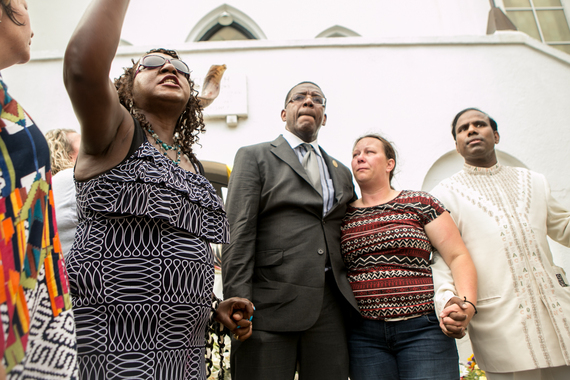
"When we meet our maker, we won't meet him in a color!" Photo Credit: Erika Chambers
A lady's voice is heard over the din of worship. Her hands pointedly gesturing toward the sky to emphasize her words, "And when you cut open the skin, we all bleed red. We all bleed the same way. And when this skin is gone and, when we have to meet our maker, we won't meet Him in a color!" Amens and applause from the gathered crowd indicate everyone's agreement to her message.
The ministers urge everyone to hold hands. Fingers of various colors lace together in a final prayer -- one which calls not only for justice for the alleged shooter, but for him to learn the love of Christ. It is an amazing display of love and forgiveness. "Yes, we pray for that man to be changed, We pray for him to be transformed. We pray for him to ask forgiveness. What he has done is wrong and no other boy should do it! But at the same time, we are standing together here to promote peace, unity and love -- though difficult."
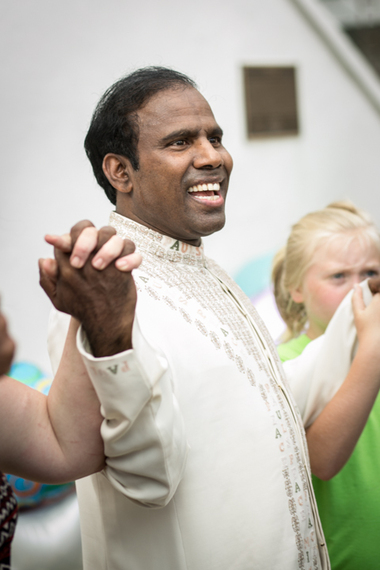
Hands of various shades lock in solidarity and prayer. Photo Credit: Erika Chambers
It couldn't get any more difficult than Charleston's past few days. However, the spirit of unity and peace pervading the city currently will hopefully carry residents on toward a peaceful future -- one that could ultimately lead to the ironing out of our racial wrinkles. One that could actually prove to the world that "we are one."

